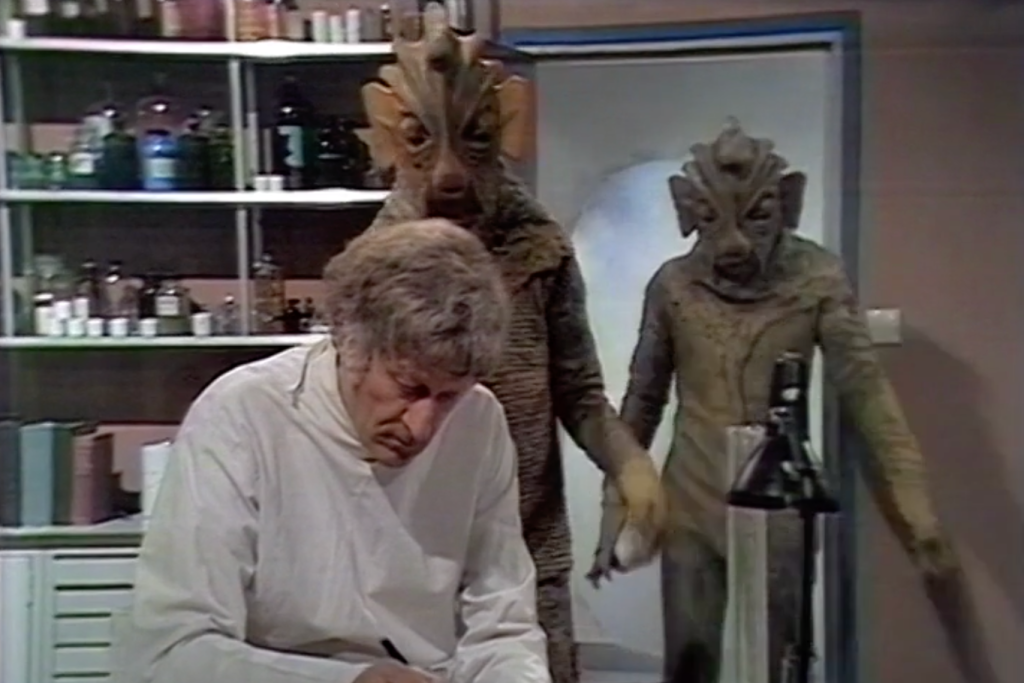
Reptilian. Biped. A completely alien species. Liz, these creatures aren’t just animals. They’re an alien life form, as intelligent as we are.
Look, Doctor, I’m not going down there to start a war, but I must know what’s going on.
So, with the science out of the way, what of the story?
Really, ‘The Silurians’ sets the pattern for the remainder of season 7 post-‘Spearhead from Space’. It is set in a scientific research base, UNIT are called in to investigate problems with a project and when dragged into the situation, the Doctor clashes with both the authorities in charge and the Brigadier and at the heart of it is a moral or philosophical dilemma, which unfolds over 7 episodes. The story was commissioned and written under Derrick Sherwin as producer, Peter Bryant was even down to produce it at one point, before they both rather rapidly left to work on ‘Paul Temple’ (Bryant’s last work on the show was purchasing Bessie!), so really it is their story. Trevor Ray stepped in briefly as stand-in producer and as the station ticket collector in episode 6! There are however indications of future direction, the incoming Barry Letts browbeating director Tim Combe into experimenting with CSO (‘we could have just done the dinosaur as a puppet and used CSO‘ – really Barry, as successfully as ‘Invasion of the Dinosaurs’?)). Also, Terrance Dicks was now the script editor and brought in the increased focus on morality and alien cultures in the aftermath of Star Trek airing on BBC in the 1969 gap between season 6 and 7. That last point is something that will become more apparent over the 5 years of Barry Letts and Terrance Dicks’ time on the show. The story even ends on a grace note added at the insistence of the incoming producer and script editor, a signifier and pointer to the future.
It never seems to get called out as such, but really it is a ‘base under siege’ story for much of the time, it even has an unhinged base commander in Dr Lawrence. The majority of the story is set in Wenley Moor research facility, in the caves of Derbyshire, housing the cyclotron and staffed by research scientists, with the aim of finding a new way of supplying cheap electricity. Also, the nearby caves, moorland and the hibernation shelter of the Silurians. However, it is also a 7-part story and as with ‘Inferno’ and to a lesser extent ‘The Ambassadors of Death’, it also has a narrative dogleg in episode 6 with the strand around the Silurian virus. For an episode and a half it basically becomes ‘Survivors’, a segment which assumes a new significance as I write this in the middle of a global pandemic. In some respects, that is my favourite part of the story – it becomes almost a documentary, cinema verite style. Along with the scene in episode 1 where the Doctor and Liz drive down Godalming high street, Bessie incongruous amongst late 60’s/early 70’s Britain, these represent a rare instance of the Pertwee era entering into the real world, away from the research bases and UNIT HQ. It is a shame that we don’t see this more often.
My dear Miss Shaw, I never report myself anywhere. Particularly not forthwith.
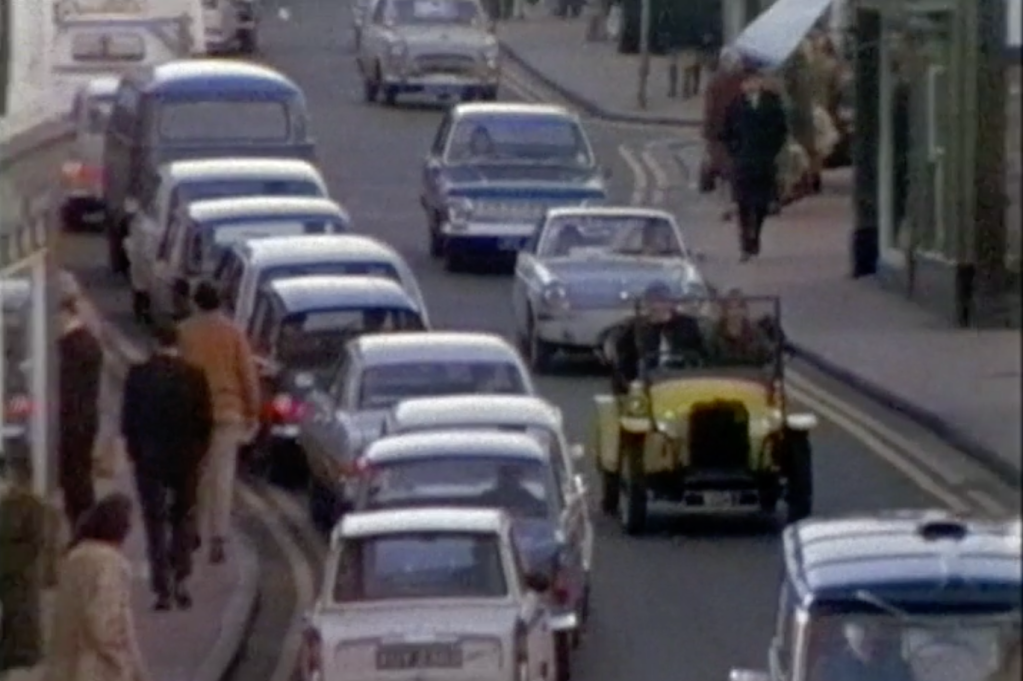
We pick up the story from the threads left from ‘Spearhead from Space’ – the Doctor has his car, he has is ‘assistant’ and his facilities to repair the TARDIS – the terms of his employment as UNIT’s Scientific Advisor. He seems happy enough singing away, working on Bessie, but he doesn’t seem to realise he has a job now:
LIZ: Urgent message from the Brigadier.
DOCTOR: Oh he’s away, isn’t he, investigating some scientists?
LIZ: Yes, well, he wants us to join him. ‘Miss Shaw and the Doctor will report themselves forthwith to Wenley Moor. Attend a briefing meeting at precisely
DOCTOR: My dear Miss Shaw, I never report myself anywhere. Particularly not forthwith.
For f**ks sake Doctor, the UN are paying for all of this, get your arse over to Wenley Moor forthwith! It is also a bit of a re-calibration of the relationship between the Doctor and Brigadier. The Brigadier isn’t some dumb soldier – in ‘Web of Fear’ he is the smartest person around, bar the Doctor and Anne. Not just a great organiser and leader of his men, he is also an excellent judge of character – he accepts the Doctor, in a completely open-minded way and backs him to hilt despite losing most of his men in process. Defending him again and giving him freedom to operate in his own way in ‘The Invasion’., all in order to get the best out of him. This is a very different Doctor though and we are transitioning to a different production team. The relationship between them is much spikier at this point in his exile, the Doctor much more abrasive and confrontational in comparison to the more slippery, elusive second Doctor. Under the new production team, in the following seasons, the Brigadier will have to adapt to Dicks’ preferred model of Dr Watson to the Doctor’s Holmes and whilst we gain from this – the humour and warmth in their relationship and the wider ‘UNIT Family’, something is also lost in the process.
Cave drawings on the walls? My dear Doctor, if that’s what you call evidence.
Lethbridge-Stewart, what on earth is the point of my trying to discover things for you if you keep turning them down all the time.
Liz is stuck in the middle between them – she’s clearly wary of both. The Doctor basically took her job in the previous story. She has a lot to do in this – investigating the staff breakdowns, working on the cure for the virus etc. but you get the feeling that she is carving out her own niche at UNIT, albeit one that might not be sustainable for her in the longer term. Her presence though soothes the way between the Doctor and authority. She is also the Doctor’s carer to some extent, a role re-purposed by Steven Moffat for Clara and the Twelfth Doctor, as he, as usual makes friends in authority at Wenley Moor:
LAWRENCE: You’re not proposing to dismantle a piece of equipment worth fifteen million pounds with a screwdriver?
DOCTOR: Well, it’s not worth fifteen million pins if it doesn’t work, is it?
Or to Dr Meredith:
As an associate of UNIT, I think you will find that I have the authority to do precisely as I please.
To be fair, both of them deserve this, but it is very much a signifier of a new Doctor. He is a new character – a hint of Hartnell’s impatience and arrogance, with a theatrical grandeur and authority thrown into the mix. He is also trapped, stuck in one time and place, which manifests itself in him sniping at authority and being much more prepared to confront things head on than his predecessor, wearing his emotions on his sleeve and being an unashamedly a principled, moral force for good. He uses the authority that UNIT provides him, the protection that the Brigadier provides from the worst of the bureaucracy and everyday life, whilst simultaneously railing against it. It is the contradiction that lies at the heart of the Pertwee era. Simultaneously a rebel and a figure of authority.
Next up: The next part will look at the moral dilemma central of the story and the characters at the heart of that.
Hello! Are you a Silurian?
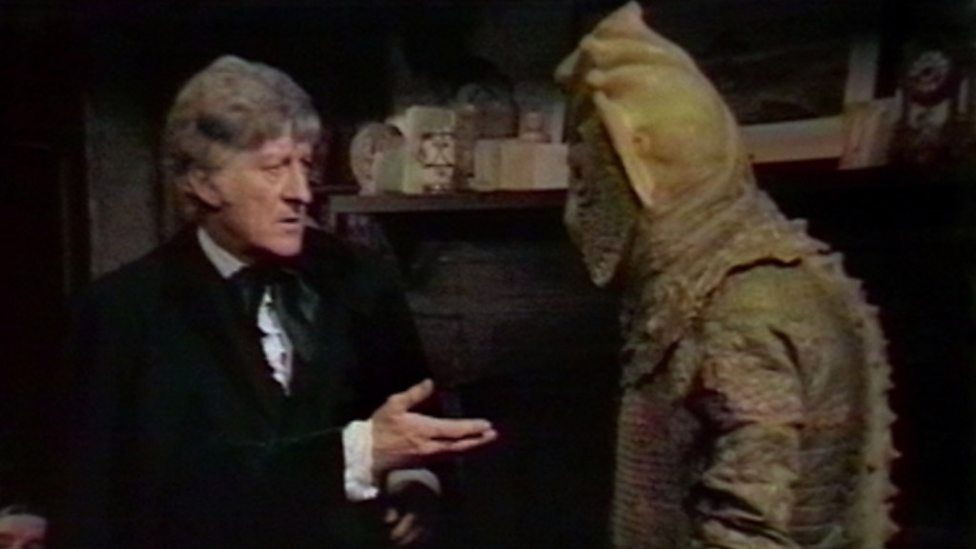
You once had a great civilisation. I didn’t realise how advanced.
I shouldn’t worry about him, Brigadier. He’s probably chatting quite happily to his monster friends.
DOCTOR: If you trust me, I think I can persuade the humans that you are prepared to live with them on this planet in peace.
SILURIAN: There is not room for both civilisations.
DOCTOR: Oh yes, I think there is. You see, your people are used to living in extreme heat, whereas these areas on Earth are of little interest to man. I believe with your advanced technology that you could build cities in parts of the world that man has hitherto completely ignored.
SILURIAN: Would your people agree to this?
DOCTOR: Well, they’re not my people, but I think I could convince them, on the condition that you release those trapped men first.
SILURIAN: Those apes have only shown hostility to us.
DOCTOR: And you to them. Someone has to make a move, otherwise this whole thing will end up in complete catastrophe.
At the heart of this story is an attempt to try and move the narrative away from ‘Doctor Who versus the Monsters’ and into more morally complex, adult waters. The results are somewhat mixed, largely I think because not enough time is devoted to understanding the perspective of the Silurians, but also because in attempting to be complex it presents them as a mirror of the humans – not a precise one, but close enough – a wiser older leader/sage (the Doctor), a militarist (Baker) and an uncaring scientist (Quinn/Lawrence). This complexity means that we get all aspects of their society compressed into 3 individuals, whereas the humans also have the likes of Liz and the Brigadier who sit between the more extreme polarized views, presenting a more ‘reasonable’ version of each. Add to that the killing of the Old Silurian and the subsequent two attempts at genocide by his successor/murderer and anything much in the way of sympathy or understanding on the Doctor’s view starts to evaporate. As the Brigadier says what we are left with is essentially:
Maybe one of the Silurians is friendly but the rest seem determined to wipe us out.
All of which prompts the question what makes them so different to say the Ice Warriors, who are also intelligent and have a culture, but want to invade, except the fact that the Silurians are a native species and have a prior claim to the planet? Which really is their unique selling point. It prompts the question whether the Silurians are intended as a representation of indigenous peoples – with their claim of being there first or at least prior to ‘the invaders’. That is a stretch though, they haven’t been usurped through force of arms or by imported disease, rather they chose to go into hibernation to avoid the worst effects of a catastrophe that never happened, it is through ill luck that they find themselves in this situation, not through the action of humans.
And this forms the heart of the problem that the show has when dealing with the Silurians. It wants to present them as a complex human-like society – with faults and prejeudices and warmongers as well as thinkers and peacemakers. In doing so it shines a light on us as a species and well we don’t look too good either when you examine our actions as a collective. To make this work properly requires a lot of effort and spending time with Silurian characters, getting to know them and their perspective and well, ‘Doctor Who’ doesn’t really have that time – it is an action adventure show for kids, it has to deliver scares and battles and explosions. So, whilst this is a noble attempt at doing something different – something that isn’t just good guys and bad guys, to some extent it it is doomed to be compromised by the format.
It would be easier to achieve in some ways if the humans were the bad guys and the Silurians were just peaceful refugees and immediately had our sympathy and clear, simple understandable position within the morality play aspect of the story. That isn’t Mac Hulke though and it isn’t really how drama would increasingly be depicted in the 1970’s on film and TV. It was the era of the damaged anti-hero, where moral lines are blurred and the drama is painted in shades of grey, where decisions and choices are difficult and the answers aren’t clearly right or wrong. In that respect it succeeds, but it would have worked better if we were presented with a clearer reason as to why the Doctor treats the Silurians differently to any other invader. I could argue that partially that is down to his own exile – he is looking for the good in them, for a cause to champion, keen to adopt the role of mediator on his new home world, guiding humans through First Contact, as we will see again in the next story. If that is the case then some lines to that affect would have been helpful.
But that’s murder...
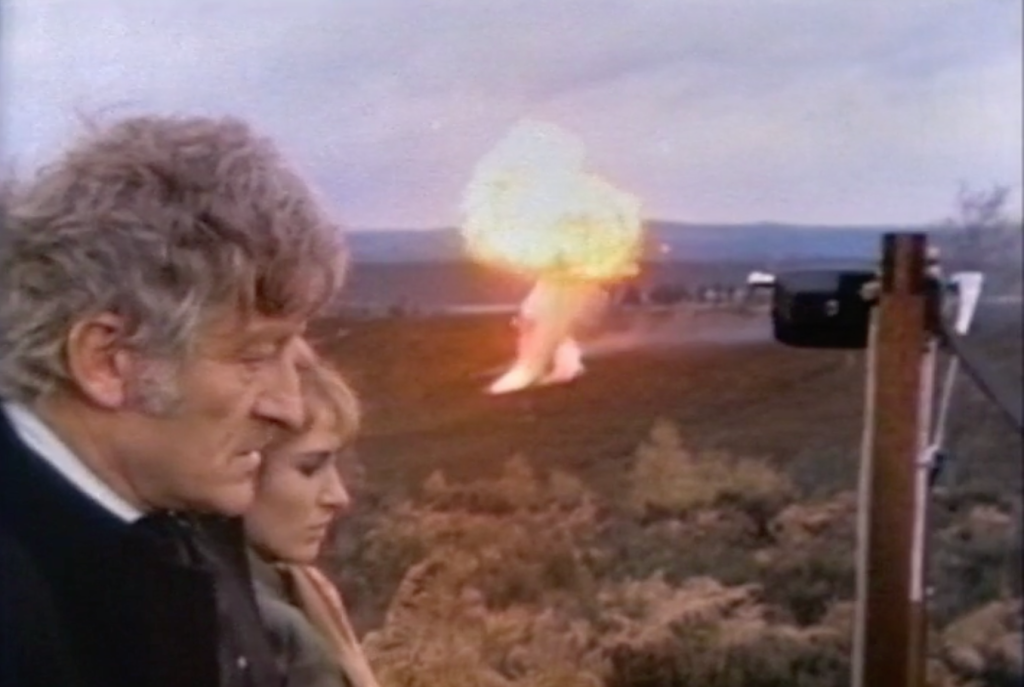
As for the ending, well is very easy to see the Brigadier’s view here. The look he gives the Doctor when he says he wants to revive them, as if he’s completely lost the plot, would be mirrored in many viewers I suspect. The Brigadier has just had to save him from being killed by the Young Silurian and they’ve narrowly escaped a major viral pandemic in which at least thousands, if not millions must have already died, escaped the climate being destroyed to the point at which humans and probably millions of other species would die out instantly and have in the process narrowly escaped a nuclear meltdown! I mean it isn’t a good look for a species that you are supposed to live peacefully with, is it?
BRIGADIER: And just what do you think you’re doing down here?
DOCTOR: I’m trying to find out how this hibernation unit works. I must know if we’re going to revive them again.
BRIGADIER: Revive them?
DOCTOR: Yes, not all at once, you understand. One at a time, so that we can reason with them. There’s a wealth of scientific knowledge down here, Brigadier, and I can’t wait to get started on it.
And later:
DOCTOR: Now, don’t forget, Brigadier, nobody is to go into that Silurian base.
BRIGADIER: Yes, Doctor.
DOCTOR: Miss Shaw and I will be back as soon as possible with some testing equipment and probably some other scientists.
BRIGADIER: Good, good. Well, have a good journey.
DOCTOR: Yes. Don’t forget, Brigadier. Nobody is to go into that base, all right? I’ll see you tomorrow.
It also doesn’t help that the ending is a bit muddled, modified by the incoming production team to generate a moral discussion point, such that it isn’t clear whether the Brigadier on orders from the government has sealed the entrance to the caves or simply blown the Silurians up, the character says the former, the Doctor indicates the latter, in the novelisation this is clear – he has sealed them in.
DOCTOR: The Brigadier. He’s blown up the Silurian base.
LIZ: He must have had orders from the Ministry.
DOCTOR: And you knew?
LIZ: No! The government were frightened. They just couldn’t take the risk.
DOCTOR: But that’s murder. They were intelligent alien beings. A whole race of them. And he’s just wiped them out.
LIZ: I know.
So I think really, this is as much about an exercise in re-positioning the show and the new Doctor explicitly as a peacemaker, a moral force – someone who instinctively holds out a hand of friendship and attempts to understand different points of view – matching the liberal beliefs of Letts and Dicks, as anything else. All of which is viewed through the prism of Mac Hulke’s instincts towards complexity and his role in life – a communist disliked and untrusted within the British Communist Party. It is a first step rather than an endpoint in itself. As it is, well it is a good if not completely successful attempt at shifting the show in a new direction. Something, I will return to after this review when I review the novelisation ‘Doctor Who and the Cave Monsters’, which by making the reader privy to the thoughts of the Silurians and the histories of the human protagonists is much more successful in this regard.
Next up: We’ll wrap things up with a look at the human characters in the story and finally a piece on my favourite part of the story – the viral pandemic section.
The scientists, the soldiers, the politician and the reptile men
As is usual in a Mac Hulke script, the characters inhabiting this world are very nicely drawn – we instinctively understand Miss Dawson and Doctor Quinn or Major Baker – their motivations and why they are the way they are. We can sketch in possible backgrounds for them easily. Where they suffer slightly though is if you already knew them from the Target book before seeing this. Once you’ve read that, you just sort of assume that you know their histories and thoughts and I can’t easily separate that out unfortunately. Each of them though has a defining surface attribute, but something else playing deeper in the mix – no one is entirely what they first seem. Hulke furnishes them with depth of character basically, something that the show even now doesn’t always take the time to do.
As an ensemble we have Dr Lawrence, cold, but overwrought, under pressure and a bit of a Tory, who simply collapses under the strain of it all. Dr Quinn seemingly unassuming and affable, but really wildly ambitious. Miss Dawson, spinsterish, someone who has bet her future on Quinn in a rather one-sided relationship, who turns out to be an avenging harpy. And Major Baker – over eager, polite and diffident to authority, but clearly also a right-wing loon worried about reds under the bed and someone who would have happily joined Powell or Mosley or that lot plotting against the Wilson government. They are quite the bunch – add in the pain in the arse Dr Meredith and only Masters seems in any way sane – that is before he dashes, Cummings-like back to London in the middle of an epidemic.
The humans (if we also include the Doctor here, inhabiting the human world as he does at this point) are more successfully sketched than the Silurians – an issue which I raised in the previous part of the review. They represent all shades of opinion – the Doctor at one end, peace at all costs – even sacrificing the Brigadier’s men in his attempt for peace (‘I lost a lot of men in those caves’), Liz who sees the Doctor’s viewpoint – but also isn’t entirely convinced by his motives, and that of the other side, the Brigadier and Masters in the middle (basically just trying to do their jobs) and the other end of the spectrum – Baker and Miss Dawson (at least after Quinn’s death). Lawrence stands to one side – he only cares about his work and his career, just as Quinn rather wants to use the Silurians for his own career.
A question of manners
Hulke drafts a very British drama of manners at times, with forced politeness under duress for a number of the characters, for example Baker deferring politely to his superior the Brigadier, only finally cracking when in his eyes the Doctor becomes a traitor and gives away the Brigadier’s position to the Silurians. The highlight of this though are the wonderfully understated scenes between the Doctor and Quinn at Quinn’s cottage. That is masterclass in writing one thing, but with a very clear and contrary subtext, one which both characters understand, but insist on playing out the ‘the surface ‘lie’ instead.
DOCTOR: What a charming place. Mmm, charming. Lovely old grandfather clock. Is this the living room? Oh yes, very nice. Very nice. Had the place long, have you?
QUINN: No, I bought it a few months after I got the job here. Look Doctor, I’m sorry but I really have to be
DOCTOR: Centrally heated too, eh?
QUINN: It gets very cold up here.
DOCTOR: Yes. Still, you do keep it very warm though, don’t you?
QUINN: Yes, well, the thermostat’s jammed, you see. I’m having it fixed.
DOCTOR: Perhaps you’d like me to look at it for you, I like tinkering with these gadgets.
QUINN: That’s very kind of you but I’ve already sent for the people who installed it.
DOCTOR: Good, good. Only it is rather like the reptile house in the zoo, isn’t it?
QUINN: What do you mean? Eh? What do you mean?
DOCTOR: Nothing. I was just referring to the temperature of the room.
QUINN: Doctor, I’m sorry but I really must ask you to leave. There’s something very urgent I have to do before I go back to the centre.
DOCTOR: Oh? Yes, yes, of course. I’m so sorry to have taken up so much of your time.
QUINN: Not at all. I’m only sorry that I seem to have been rather
DOCTOR: My word, it’s just as hot out here, isn’t it? You really must get that thermostat fixed, you know. Anything wrong?
QUINN: Er, no.
DOCTOR: You’d save yourself a lot of trouble if you’d let me help you. They didn’t catch it, you know.
That is a terrific piece of writing and beautifully played by Pertwee and MacKay.
In opposition to this mannered behaviour, we have the downright rude Lawrence and Meredith. Both of whom get this returned in spades from the Doctor, who also dishes a fair bit of this in the Brigadier and Baker’s direction. He, in what will become somewhat of a theme for the next couple of seasons, is unnecessarily rude to Masters – the under secretary, played beautifully as ever by Geoffrey Palmer:
LAWRENCE: Now just a minute. This is the Permanent Under-Secretary.
DOCTOR: Yes, well, I’ve got no time to chat to under-secretaries, permanent or otherwise. I must find the Brigadier.
MASTERS: May I ask who you are?
DOCTOR: You may ask.
In later stories the antagonistic role would probably have been given to the politician, it is interesting that here it is instead given to two technical people – scientific and medical. Something similar is done with Stahlman/Sir Keith Gold in the final story of the season.
The life and death of Dr Quinn
I have already talked about the great scenes between Quinn and the Doctor at Quinn’s cottage. It is a lovely performance from Fulton MacKay as Quinn – pitched beautifully. He is completely in control when working in the research centre, calm when others lose their head. Rather affable and likeable. However, as ever with Hulke, he turns out to have a hidden nastier, more ambitious side:
DAWSON: John, you’ve got to tell them to stop. At least while these people are here.
QUINN: Do you think I haven’t? Either they don’t listen, or they don’t understand.
DAWSON: They’ve got to stop!
QUINN: Shush.
ROBERTS: T one four, S K.
QUINN: Thank you, Roberts.
DAWSON: Tell the Brigadier or Baker, they’ll help. Before someone else gets killed.
QUINN: They wouldn’t believe me, and anyway there’s far too much at stake. Now take your hand off.
DAWSON: It’s not worth the risk.
QUINN: The knowledge I shall gain is worth any risk.
Quinn’s death in his cottage, killed by the Silurian who he is harbouring, is really the turning point in the story. We’ve already seen a farmer murdered and a death in the caves, but this is someone we know and it has a big impact on the response of the human characters to the Silurians. Especially on Miss Dawson, all of her dreams of a life with Quinn gone and she demands they be destroyed, venting her hatred and bitterness against them, but in a way which seems reasonable from her perspective – again very Malcolm Hulke. This is the same Silurian to whom the Doctor offers his hand to in greeting, with Quinn’s body still warm in the background. At this point many members of the audience must have started to doubt the new Doctor’s sanity.
I honestly think that Fulton Mackay’s performance is one the best of the classic run. He was considered quite strongly or the role of the fourth Doctor by Barry Letts. Now obviously Tom Baker turned out to be a brilliant choice, but Mackay I think would have made a fine Doctor – able to effortlessly do the comedy, the drama, whilst likeable and mildly eccentric and with a lightness of touch.
Dr Lawrence and the high pitch of doom
The comedian (and ‘Doctor Who’ fan) Frank Skinner tells a story about someone singing the song ‘Can’t take my eyes off you’ at a club. He starts out singing just a bit too high and he’s leading up to the part where it goes up into ‘I love you baby..’ and as he’s really going to have to belt that out. The audience starts to wince, sensing he’s got nowhere else to go, he’s going to rupture something to reach that high note. The music builds and as he reaches that line he turns his mic to the audience for them to sing it instead! That’s Peter Miles as Dr Lawrence. By the end he’s a foam flecked loon trying to strangle the Brigadier, a bit more restraint would have worked much better – more the cold, detached careerist, basically a bit more Nyder would have helped and then his meltdown, well maybe dial back from 11 to 9?
The Reptile men
And finally we have the Silurians. Nowhere near as much effort has gone into the building of their characters, as a fair part of their screen time has to be spent on them being monsters hiding in the shadows and the killing people, unleashing a virus etc, We have the Old Silurian – the one who deals with Quinn and is open to negotiation and compromise, the scientist – rather cold and detached and the Young Silurian – hotheaded, ambitious and genocidal. Each of these have echoes in their human counterparts, but don’t really have the depth of character building, the shades of grey or diversity of the humans. Certainly not enough to give them equivalence or to sufficiently build out sympathy for them. The early death of the Old Silurian also feeds into that as an issue. For that level of depth, you must turn to the novelisation.
Next up: The pandemic!
Viruses, vaccines and superspreaders
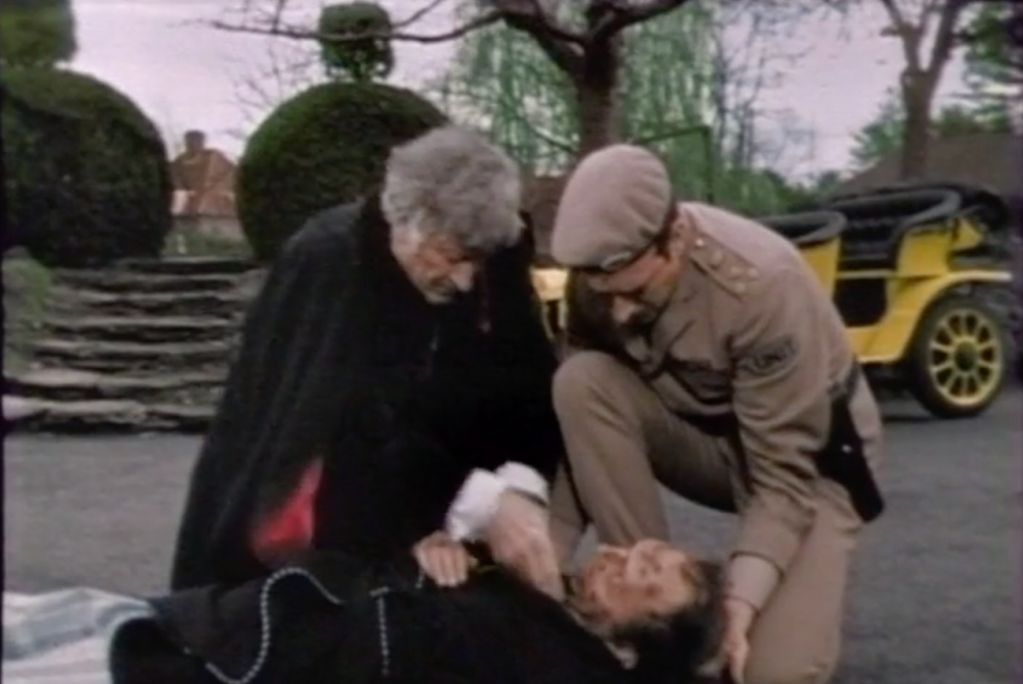
Is he dead? Yes, the first one.
Part of the way through episode 5, ‘The Silurians’ takes a sideways turn, as for an episode and a half, it becomes ‘Survivors’. The Silurians release a virus designed to kill primates and release an infected Major Baker to spread the disease – the original ‘superspreader’ event.
Given that we are currently in the middle of a global pandemic, it is difficult not to view this aspect of the story through that lens and an analysis of it shows some similarities with the epidemic response we are experiencing – although having the Doctor work on an effective treatment would help considerably right now!
To my mind, this plot strand is one of the most satisfying aspects of the TV story, it is very effectively and efficiently done and brilliantly shot by Tim Combe. Actually, it is so effective that I do wonder if it shouldn’t have been a story in its own right – an alien pathogen comes back from one of the Mars Probes – unleashed on London and the Doctor has to tackle the unseen enemy – it sounds very season 7 as a concept. If any era of the programme could pull that off it would be this one. As it is, it provides a very satisfying narrative shift within ‘The Silurians’ and ensures that the story reaches its 7 episode length without ever really sagging.
Track and trace
Bad news, Miss Shaw. The first one abroad. Paris. If we can’t contain it in Britain, what chance has the world got?
Once the outbreak is confirmed and the boneheaded Dr Meredith has moved Baker to the nearby hospital things start to spiral out of control. Masters hightails it back to London by train liberally spreading the infection as he goes. There is a similar strand in an episode of ‘Doomwatch’ where a politician spreads a virus as a result of lax bio security. Our own Prime Minister did something similar back in March – when he went around hospitals shaking the hand of everyone he met. So, in that respect Masters conforms to type – his cross-country dash as reminiscent of Dominic Cummings and his journey back to Northumbria and infamous day trip to Barnard castle.
LIZ: Masters is gone.
DOCTOR: Gone where?
LIZ: He caught the London train. He must be nearly there by now.
BRIGADIER: Right, I’ll get onto it. Maybe we can get him at the station. Will you come with me, Miss Shaw?
LIZ: Oh, I’m helping the Doctor.
BRIGADIER: I’ll need help manning the phones.
LIZ: I am a scientist, not an office boy.
BRIGADIER: You’re a member of UNIT, Miss Shaw, and you’ll do as you’re told!
LIZ: I will not be spoken to in that way!
DOCTOR: Liz.
LIZ: Doctor!
DOCTOR: Go with him, please. Anyone who’s been in contact with Masters has got to be quarantined. He may spread that disease all over the country.
The story even his its own ‘contact tracing’ operation run out of the Brigadier’s makeshift HQ at Wenley Moor. Liz has to help ‘man the phones’ and she and the Brigadier co-ordinate efforts to track down Masters and anyone he has contacted on the way. Cue some sterling trimphone acting from Nicholas Courtney and Caroline John! Their efforts are as sadly ineffective as the UK’s own contact tracing operation – although to be fair it is just a few people and costs considerably less.
At Marylebone station
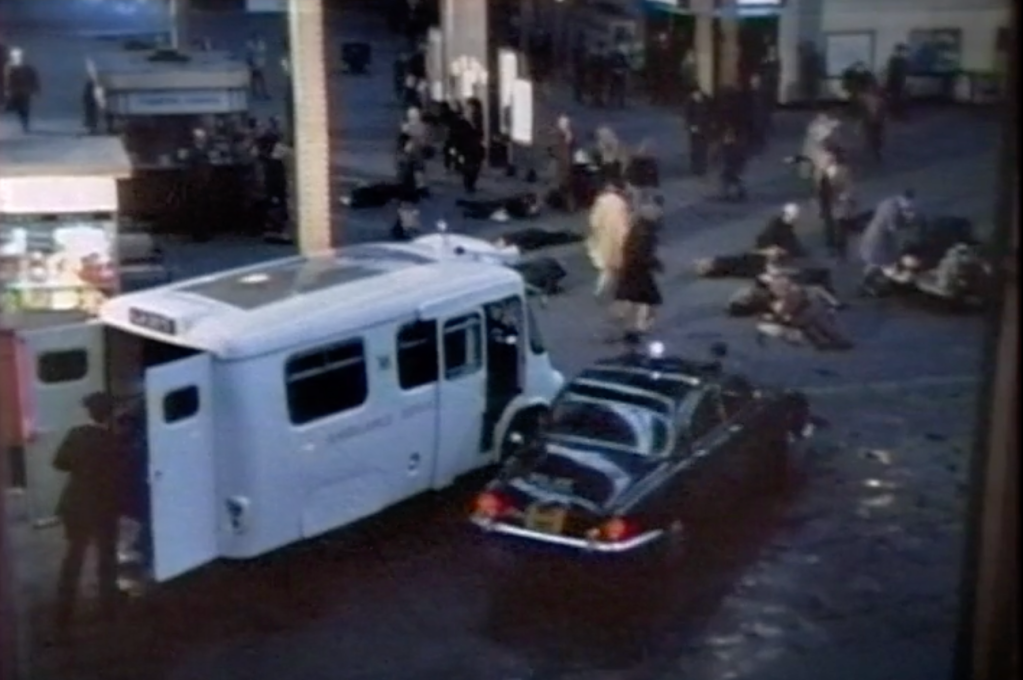
Attention please! Attention please! This is a police message. Stay where you are. Do not attempt to leave the station. If you feel ill, assistance will be brought to you. Attention, please! Attention, please! This is a police message. Stay where you are. Do not attempt to leave the station. If you feel ill, assistance will be brought to you.
Outbreaks of the disease are being reported all over London.
The scenes as Masters reaches Marylebone station are some of the finest in the history of the show. They are brilliantly shot, documentary style as real members of the 1969 public get off their train along with Geoffrey Palmer as Masters and step around him as he stumbles at the ticket inspection. The ticket collector is Trevor Ray – associate script editor at the time and filling in as makeshift producer as Bryant and Sherwin left before Barry Letts had arrived. Somewhat unusual perhaps, although in the previous story we had had Derrick Sherwin as former script editor, current producer and actor as the UNIT commissionaire.
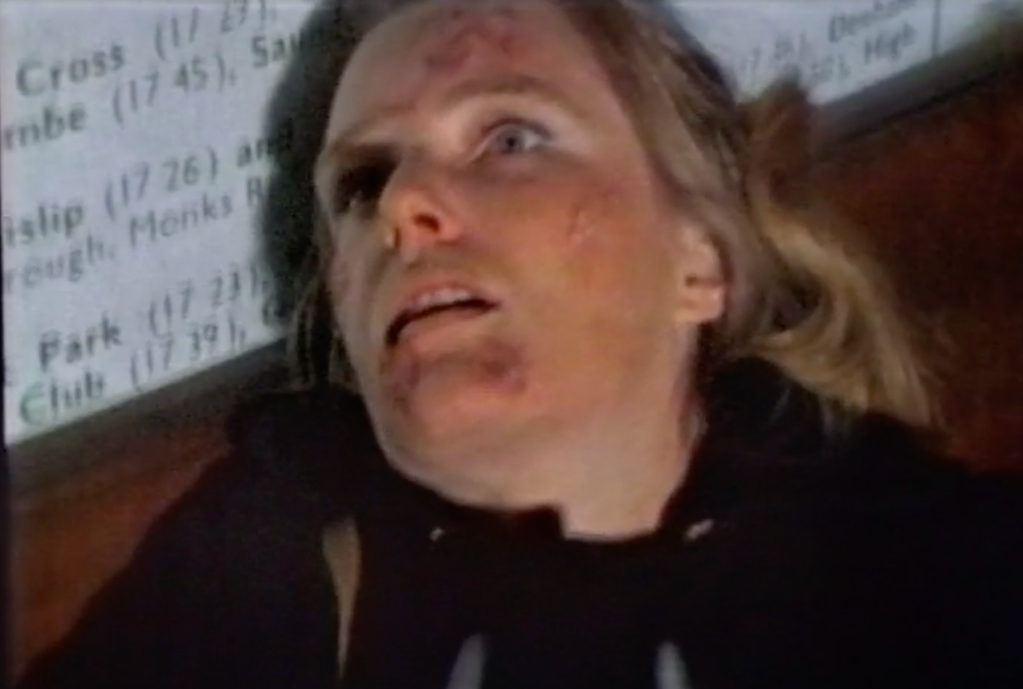
Amidst the extras, collapsing infected by the disease, we have the public reacting to them – either with concern or in typical London fashion by simply ignoring what was going on and walking away! These scenes though are genuinely disturbing, as much as anything in ‘Survivors’ and are as real as ‘Doctor Who’ has been or would get in the entire classic run.
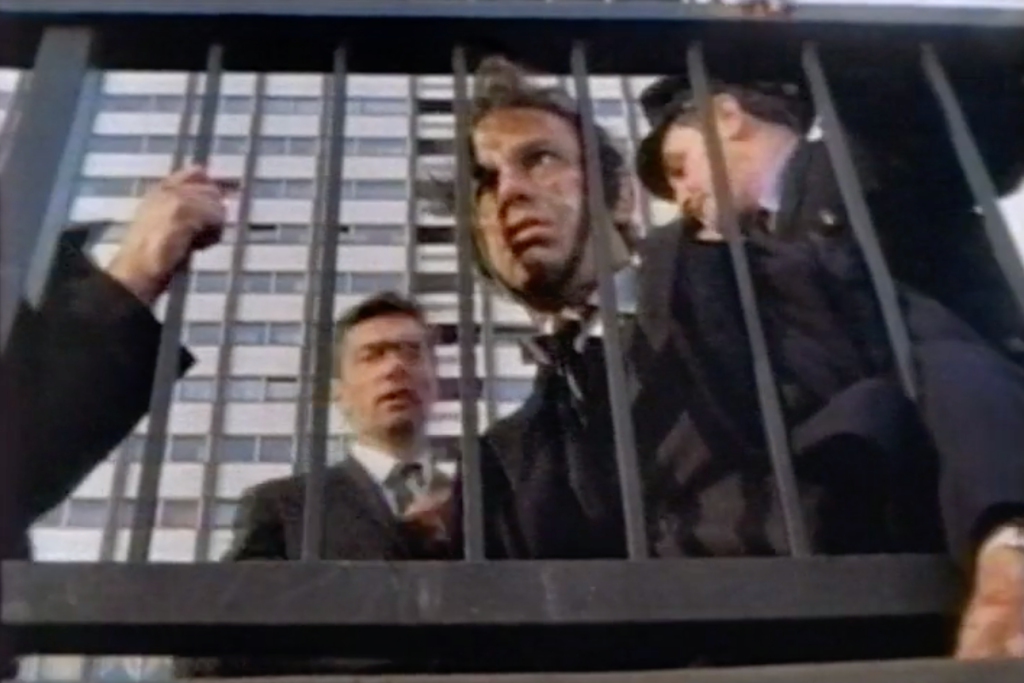
The death of Masters – collapsing after leaving the taxi, the telltale signs of infection on his face as he stumbles, his world spinning around him, really is brilliantly done. He staggers and falls – dying in a 1970’s world of concrete underpasses and office blocks, as the police and ambulances arrive.
In other times this whole section would probably have been handled via ‘tell don’t show’. As Barry Letts controlled costs and Terrance Dicks scripted economically. In the heady days of season 7, rules are broken and a viral epidemic and its impact on London are graphically shown. The sense of uncompromising ambition of this season is so refreshing, if only all of this had been on film like ‘Spearhead from Space’.
A vaccine?
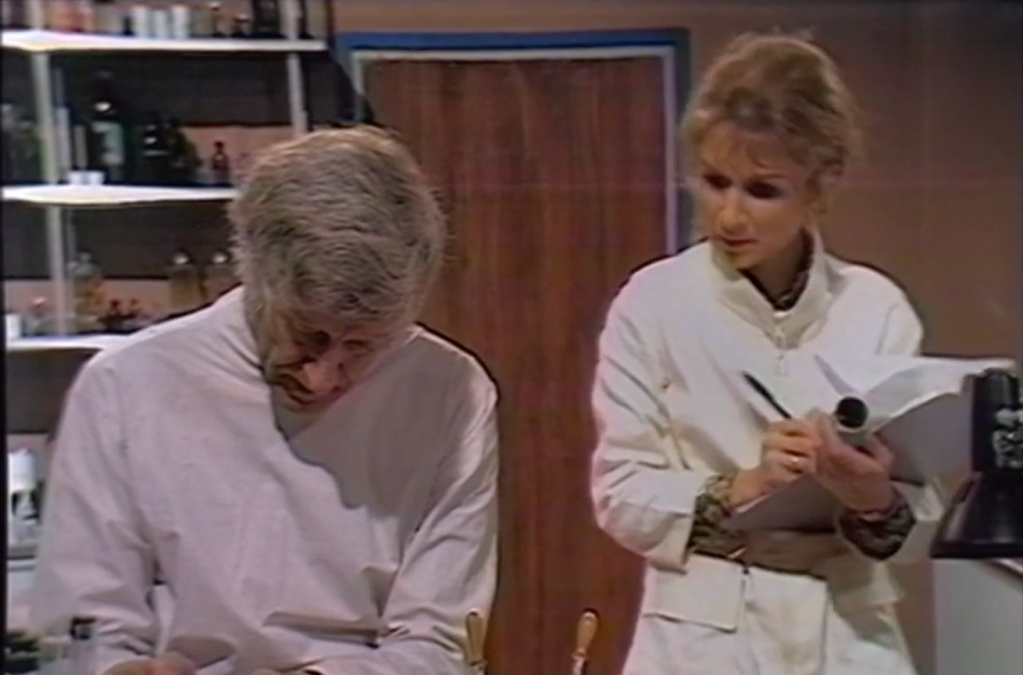
Some of these drugs are so new they don’t even know their properties yet.
Do you think we’ll be able to contain this disease, Doctor?
We may be able to contain it. The question is, can we cure it?
And that is where we are right now! As I write this, two vaccines for covid-19 appear to have tested positively. The Doctor and Liz have one night to find a cure! What I do like though is that they are shown ‘doing science’. That it takes time (even if it has to be compressed for story purposes) – they work through the night – Liz flagging, dosed up with antibiotics in the hope of keeping the virus at bay long enough to cure it. In season 7 things take time, science is hard, time consuming, difficult work.
Virus denial and vaccination protests
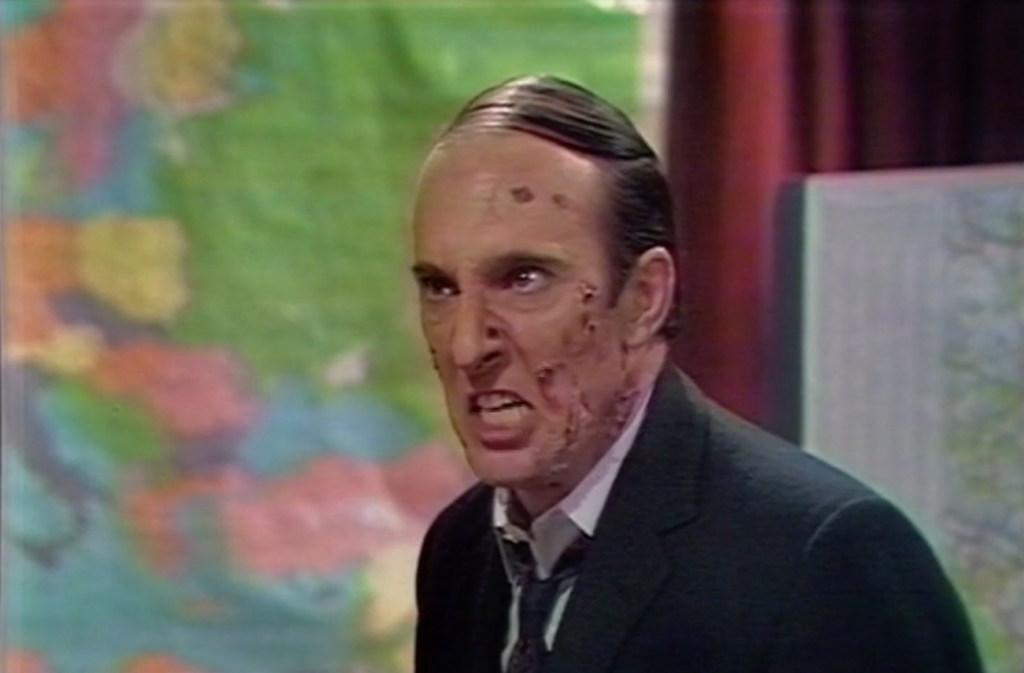
LIZ: You haven’t had your own injections yet, have you?
LAWRENCE: No, nor do I intend to.
LIZ: But you’ve got to have them. It’s for your own good.
LAWRENCE: Rubbish. Why should I waste my time having useless injections against an imaginary epidemic?
LIZ: Doctor Lawrence, it is quite clear that the disease exists. Major Baker is dead.
LAWRENCE: He may have been ill for some time. I should be interested to see the results of the post-mortem.
LIZ: Doctor Lawrence, you must admit there is a
LAWRENCE: I will admit nothing. There is no epidemic.
Like many an epidemic denier and anti-vax protestor, Dr Lawrence catches the disease and dies of it. And what a death! Not the understated, documentary realistic collapse of Masters, no a full on ranting and raving, attempting the strangle the Brigadier breakdown for Peter Miles!
Meltdown
So to the ending. Well it twists again, the menace of the virus over (although we assume many thousands are still dying as the cure is rolled out) , the Doctor kidnapped by the Silurians and a Silurian invasion of the Wenley Moor research centre. An attempt to destroy ‘The Van Allen Belt’ (see my previous article on that!) and a near nuclear reactor meltdown. Phew. Mac Hulke really packs a lot into the last episode. It doesn’t hang about and doesn’t feel dull or anti-climatic like many of the later 6-part stories.
With the Silurians back in hibernation, it is unsurprising that the Brigadier (after the saving the Doctor’s life) gives the Doctor a look of sheer incredulity at this exchange:
BRIGADIER: Revive them?
DOCTOR: Yes, not all at once, you understand. One at a time, so that we can reason with them. There’s a wealth of scientific knowledge down here, Brigadier, and I can’t wait to get started on it.
It isn’t to be though, the caves are sealed/blown up and the Doctor is left to drive away in Bessie with Liz, leaving Wenley Moor behind and to reflect on his new life and friends.
Pointers to a future direction
Overall, I think that ‘The Silurians’ would be a high point of any other Pertwee season. In season 7 though it is the weakest story, which is no bad thing to be – the others are all 10/10 stories for me – this is a mere 8 or 9. It does point a way to the future though, to a new morality for the show, combined with a complexity and a satisfying depth. With the addition of the virus subplot easily making it fit the 7 episodes length, in a far more successful way than most later Pertwee 6-parters manage. As for the new man himself, Pertwee is simply sensational in this – gloriously confident and assured and is ably supported by Nicholas Courtney and Caroline John and an excellent guest cast.
Mac Hulke is really starting to hit his stride as a writer by now and up next I will look at his novelisation of the story ‘The Cave Monsters’ and the layers that it manages to add to the story.